|
Here at Ferrets and Friends, we have been hard at work training our two newest ferret recruits how to get along with people. Pabu and Abu have just turned seven months old. At this age, young ferrets are gaining more impulse control so they become easier to train. It's important to remember that ferrets tend to play rough so it is part of their nature to be rough with their human friends. Ferrets can be gentle and affectionate pets, but it is our responsibility to teach them how to best communicate with us. We have put together some of our top tips to help with the communication process. Reduce Opportunities to Learn Bad BehaviorsLike most young mammals, young ferrets have a tendency to explore the world with their mouth. New objects are sampled with their teeth. In their excitement, they will nip at stuffed animals, pillows, furniture, electrical chords, shoes, and even their human caretakers. Their mouth-first approach at life will lesson as they get older and many ferrets naturally grow out of their nippy phase. However, if they discover that a nip at an ankle will produce of fun game of tag with their human companion, then that's something they will not outgrow. To minimize bad behaviors, keep unsocialized ferrets away your face, neck, and elbows. Wear long pants and use whatever foot coverings are the least interesting to your ferret (some may chewing socks, while other find endless entertainment in shoes). Gradually expose your ferret to other interactions at times when your ferret has the best chance of success. For example, towards the end of play time when your ferret is most calm, you may snuggle your ferret near your face or allow your ferret to sniff your feet. These interactions should be brief and followed up with positive reinforcement when your ferret shows calm non-biting behavior. Look for Good Behaviors and Reward ThemCommunication is a two way street. As much as we would like to simply tell our ferrets "don't bite me!", we also have to pay attention to their interests and desires. Ferrets tend to be very quiet pets so it is easy to miss some of their cues for our attention. If your ferret is biting your feet in order to get your attention, chances are that you have already missed several other cues that they have tried which caused them to resort to biting. To avoid problem behavior, look for the behavior that you want to see and respond to that behavior. If your ferret walks over to you and looks up at you, acknowledge their presence and offer your attention. If your ferret appears to be in a playful mood, encourage your ferret to play with toys instead of nipping your hands. Reward good behaviors before they figure out that bad behaviors work better. If your ferret has already developed a biting habit, you can reduce this habit by gradually working backwards towards more acceptable behavior. For example, you can teach your ferret to move from biting to lighter nipping, to licking, and eventually to just sniffing. This is done by rewarding the more tolerable behavior and putting a ferret in a time out for the more severe behavior. As your ferret learns, you continue to move the bar closer to the type of interaction that you want to have with your ferret. This technique has worked well for us with more anxious ferrets. If you have a nippy ferret who gets punished every time they bite you, your ferret may interpret these punishments as you not wanting to interact with them. By rewarding your ferret for more tolerable (but not ideal) behaviors, this teaches your ferret what direction to move towards rather than confusion about your interactions. Find What Works Best for Your FerretEvery ferret is different. For some ferrets, scruffing their neck and a soft hiss easily communicates that a nip was unwanted. Others may get more excited and bite harder! Time outs can be effective deterrents for some ferrets, while others may take the opportunity for a nap. It is equally important to find what motivates your ferret. Some may be motivated by treats, while others enjoy a shoulder scratch, or a chance to play with their favorite toy. Each ferret has an individual personality and has different things that motivate them. It is also important to look at the context of a biting behavior. Ferrets that bite while being held may be trying to communicate that they would like to be put down. Some ferrets may bite when they hear high pitch sounds (such as squeaky toys) or smell certain chemicals. These distress bites should be recognized and appropriate changes should be made to their environment (getting rid of squeaky toys or not wearing strong smelling cologne when handling your ferret). Ferrets are quick learners so if you do not see improvement within a week or two of working with your ferret, try a different tactic. For best results, make sure at least one part of your training involves positive reinforcement.
2 Comments
Update: A series on this topic has been written since this blog posting and can be found here: Keeping Ferrets and Other Pets: Part One (Evolution and Domestication of Ferrets) Keeping Ferrets and Other Pets: Part Two (Basic Safety for Your Other Pets) Keeping Ferrets and Other Pets: Part Three (Safety for the Ferret and Understanding Behavior) Keeping Ferrets and Other Pets: Part Four (Advanced Training Techniques for Professionals) Ferrets and parrots have many traits in common. They are both highly intelligent, social animals and are great pets for people who are not able to have cats and dogs (whether by allergies or living situations). It is understandable that many people who would be interested in owning a ferret might also have an interest in parrots or vice versa. A preliminary search on the internet may tell you that letting both of these species in your household could be ill-advised. Ferrets are well documented to have injured or killed pet parrots to the horror of their owners. Ferrets are members of the weasel family and, like their wild relatives, they are incredibly skilled predators. With only 2,500 years of domestication, their predatory drive and instincts have not been dulled to the same degree as dogs and cats. Although they make sweet and loving pets to their human companions, there are many considerations and precautions necessary for those who would like to own ferrets and other "prey" type animal companions. Our Feathered FriendsMany people may focus on the issues surrounding the mammalian part of this multi-species household equation, but it is also important to consider the parrot's health and behavior. Smaller parrots may recognize ferrets as potential predators which could cause them to become stressed at the sight of them. Other parrots may interpret ferrets as a curiosity or a nuisance. Parrots will become stressed if they feel trapped and unable to escape the view of potential predators. Parrots also tend to defend their territory, food, and favorite people which may cause them to try to attack the ferret instead of retreating from it (which would arguably be the safer option for the bird). Parrots with clipped wings not only lack the ability to fly away from a threat, but will be more likely to act aggressively towards an animal that causes them fear. Parrots that act in a fearful manner (screaming, fluttering the wings, flying, or trying to bite) will appear more interesting a ferret and are more likely to trigger the ferret's predatory reflexes. This does not mean that a calm parrot is safe around ferrets. Parrots have fragile bodies when compared to ferrets. Even if it appears that your ferret and parrot want to play together, this should not be allowed under any circumstances. Even strong parrot beaks can be punctured by ferret teeth. There is also concern about gram negative bacteria (which ferrets, cats, and people carry) that can be harmful for parrots. Many owners show caution about sharing drinks with their parrot as some of this bacteria can be found in saliva. Parrots should not be allowed to sample ferret food as ferret food will be very high in protein and this can cause health problems for your parrot. While birds do not tend to have strong olfactory systems, parrots are one group that are found to have some sense of smell. While this plays a role in helping them locate food, it is unknown to what it extent they might use it to avoid predators. It is possible that ferrets' infamous odor may bother your feathered friend, but using certain types of air fresheners could be hazardous to your parrot's health. For ferret owners considering adding a parrot to their home, they should consider what methods they use for odor control as these may need to changed with the addition of a feathered friend. Our Ferret FriendsWhile the risk of injury or death may be lower for your ferret, there are other ways that parrot ownership may impact your ferret's life. As obligate carnivores, most of what your parrot eats will be incompatible with your ferret's diet. Parrots have a tendency to share their food by flinging it everywhere. Especially harmful are fruits that are high in sugar. Food that falls to the floor and is consumed by ferrets may cause diarrhea. If it is routinely consumed, it may contribute to the develop of other illnesses. Parrots also tend to be quite vocal and most of their vocalizations are within a ferret's hearing range (even some sounds that we can't hear!). Some of these vocalizations can be distressing to your ferret in the same way that they become distressed upon hearing a squeaky toy. There is debate whether this is due to a trigger of their predatory drive or if the sound mimics the cries of baby kits or injured ferrets. Neither of these interpretations are good in a home with parrots. For our ferrets, we keep a white noise machine running in their room so that they are not distressed by our flocks' communication throughout the day. Finally, ferrets have an exceptional sense of smell. Some individuals may have a high predatory drive and could become frustrated if they frequently smell the presence of a prey animal and are unable to access it. However, most ferrets can become accustomed to the smell and largely ignore the presence of parrots in the home. Living Together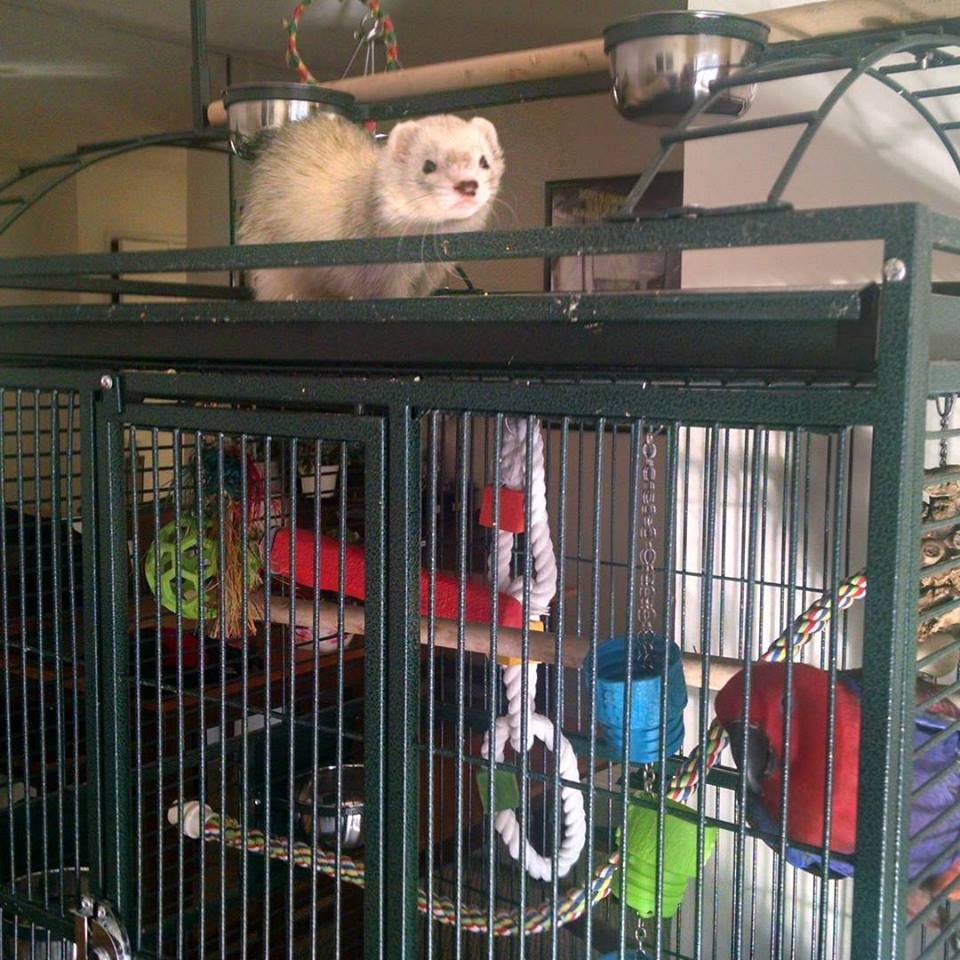 Ramona (ferret) was able to climb to the top of Missy's cage when a cat scratching post was left within ferret-jumping distance from the lower portion of the cage. Thankfully she made it with all her toes intact! Ramona was only discovered when Missy continued to show agitation about her unwelcome visitor. If you decide to share your home with both of these animals, we recommend that you plan for at least three barriers between them when they are not supervised. For example, the ferrets might be kept in a cage in a room with the door closed, while the parrot resides in its cage in another part of your living space. A parrot's cage is not ferret-proof. These cages were designed to contain your bird, not to keep ferrets out. Many bird cages do not have locking mechanisms for the small doors that allow access to food and water bowls. Trays that slide out at the bottom of the cage often have very little to keep a determined ferret from wiggling their way in. Bar spacing that is larger then three quarters of inch is more than enough space for a some ferrets to squeeze through. Anywhere a ferret's skull can fit, they can fit. Even some doors designed for people have enough room for a ferret to slide under! If your parrot's cage has bar spacing of one inch or greater, we would advise having at least four barriers since the parrot's cage cannot be considered an effective barrier. Add extra locks to cage doors and trays. We find that using a pellet type cage lining at the bottom of our parrot cages makes the trays too heavy for the ferrets to push. Alligator clips work well to secure the smaller doors for our smaller parrots. Cages for larger parrots tend to have locking mechanisms on all the doors as larger species of parrots are often smart enough and strong enough to figure out how to open their own doors. If these precautions seem extreme, keep in mind that the only thing keeping your ferret from hurting your feathered friend is time and access. Once you have done everything to make sure there are sufficient barriers in place, it is time to figure out a schedule for your pets. If your parrot's cage is in any area that your ferret can access during their play time, you may want to temporarily find another play area for your ferrets while your parrot adjusts to its new home. If your parrot is the established family member, you may want to slowly expose your ferret to its presence as it will likely be excited and overstimulated by the new environment. You will want to figure out a schedule in which there is adequate supervision whenever the number of barriers are reduced. If your household has other adults or children, it is extra important to communicate about when each animal will have its social time. After some time, you might gradually reduce number of barriers during supervised out-of-cage time. If your ferret has access to your parrot's cage and seems to ignore your parrot, please do not assume that your ferret is not interested in your bird. Your ferret may have been desensitized to the smell and sounds of the parrot, but it does not mean that your ferret is not interested in your bird. Ferrets are extremely near sighted and so it's unlikely that they can see and recognize your parrot while it's in its cage. Being able to see the parrot is guaranteed to renew interest in your bird and can trigger their predatory response. Ferrets can move very quickly and it only takes a second for your ferret to potentially injure your bird. Introductions between these species should only be attempted by professionals or those who are highly experienced with both animals. Please do not attempt this "just to see what will happen" as it has very high risk for both your ferret and your bird. Videos in which ferrets and parrots are seen calmly interacting or co-existing are likely created after a long process of behavior modification and training. Even with this training, the predatory instinct of a ferret can never be completely extinguished. If you would like to see cute interactions between these species, please enjoy the work of professionals and prioritize the safety of the animals in your own home! |
About the blogFerrets and Friends, LLC has four writers bringing you information on a variety of topics from pets to wildlife, education to conservation, and from new developments in our business to information about our industry. Learn something new each week! Archives
August 2020
Categories
All
|
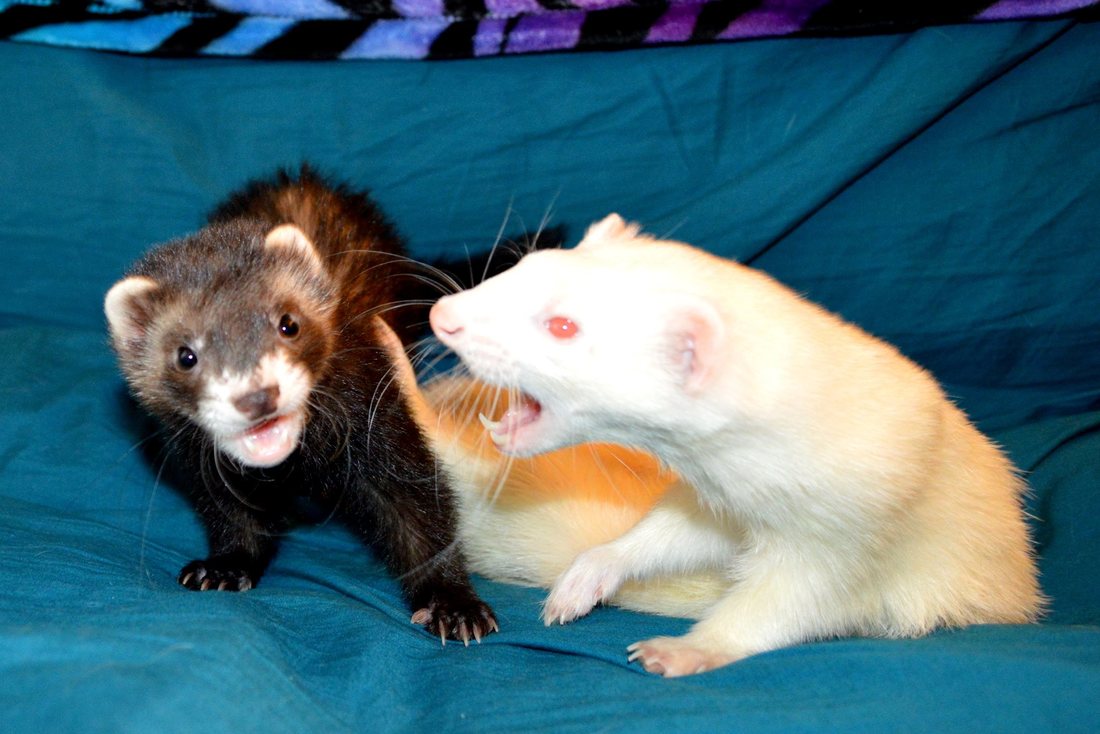
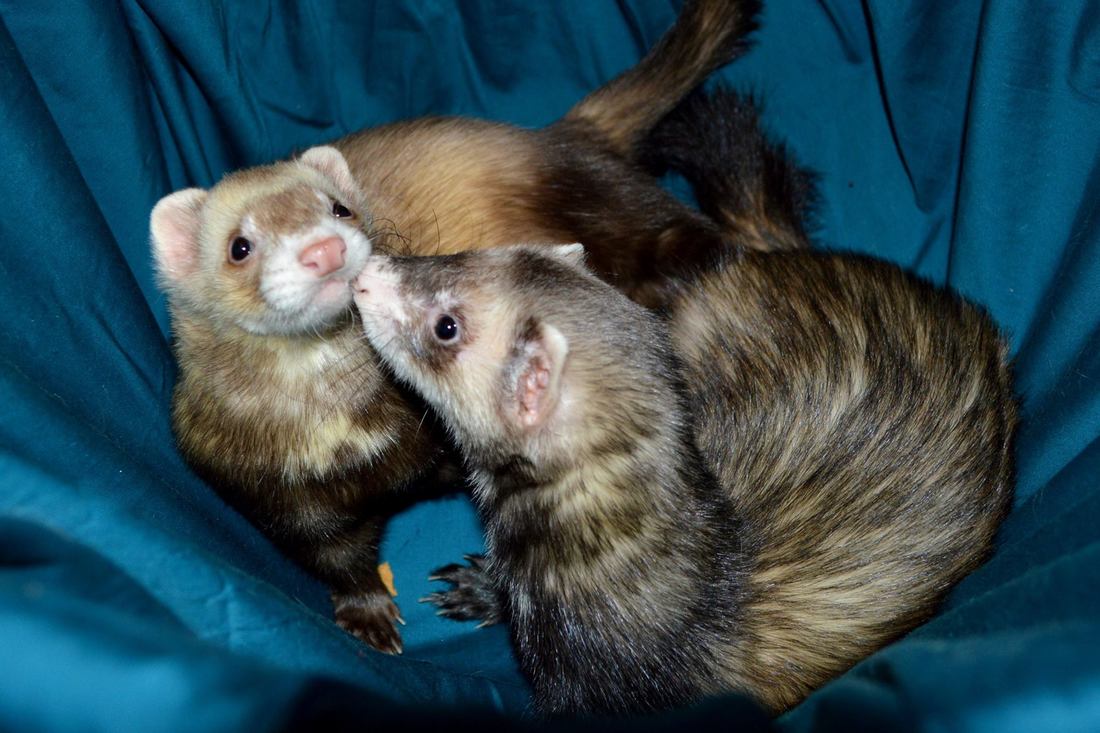
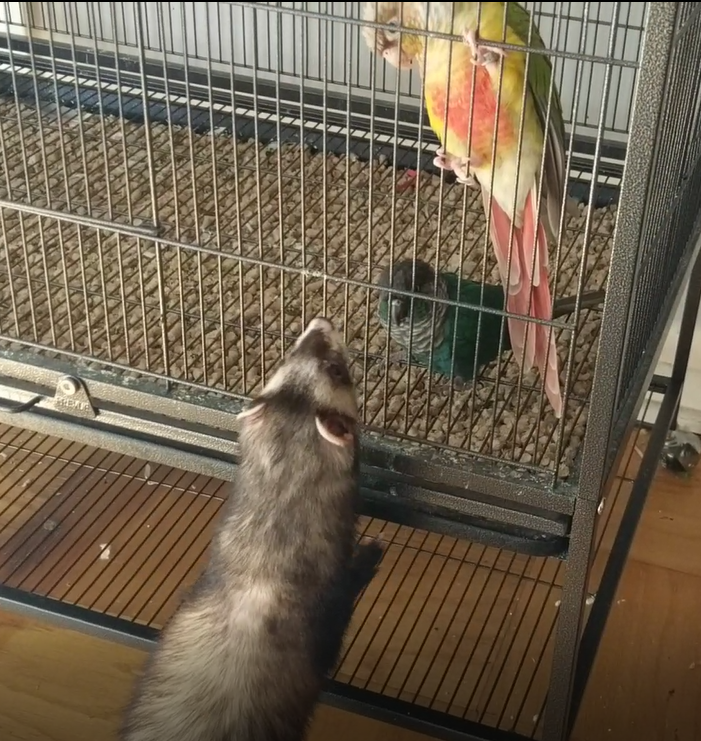
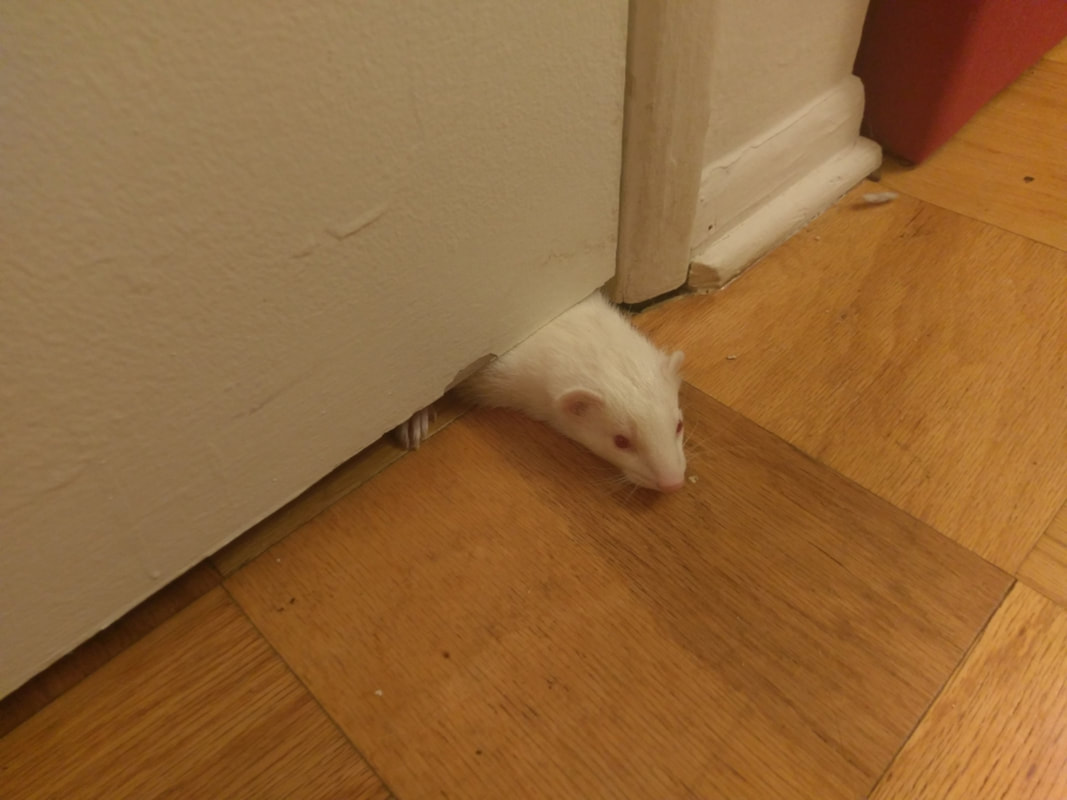
 RSS Feed
RSS Feed